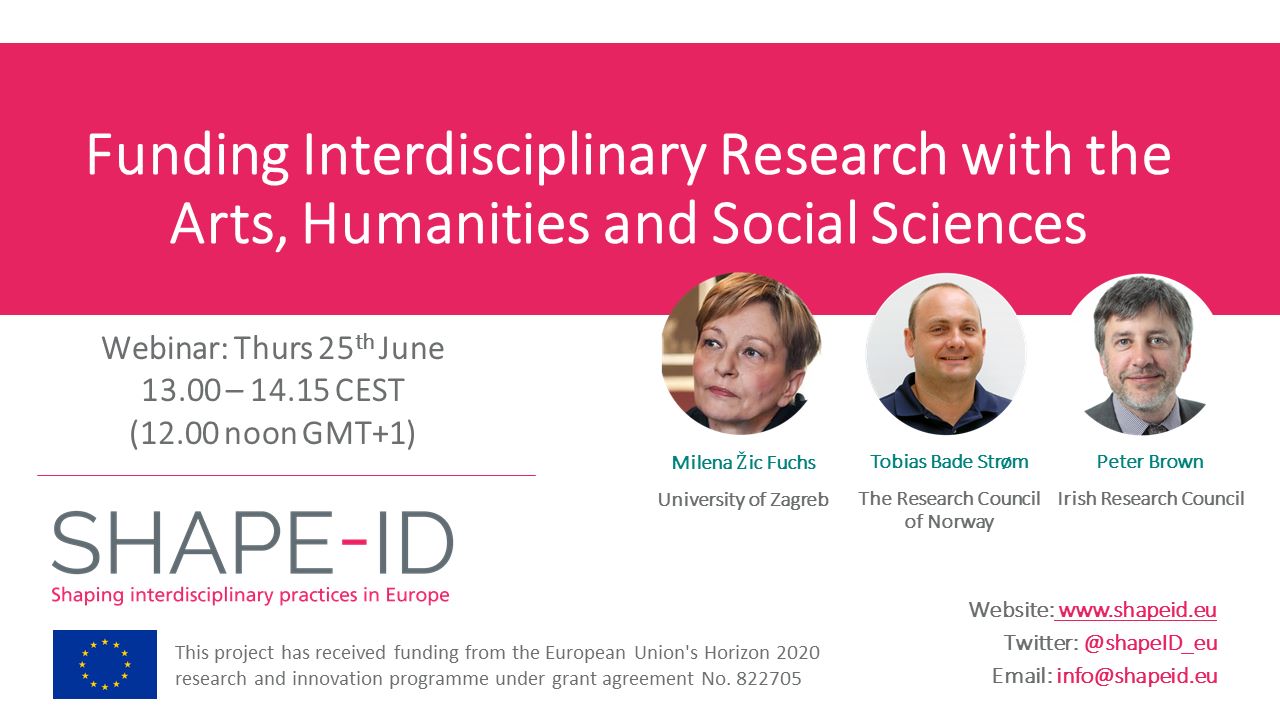Event
Funding Interdisciplinary Research with the Arts, Humanities and Social Sciences / Shaping Conversations on Interdisciplinary Research (SHAPE-ID Webinar Series)
We are pleased to announce the programme for our SHAPE-ID webinar series for the coming months and we invite you to join us for some interesting discussions around interdisciplinary and transdisciplinary research involving the Arts, Humanities and Social Sciences.

Date: Tuesday 10th November 13.00 – 14.15 CET (12.00-13.15 GMT)
Register: https://zoom.us/webinar/register/WN_7S6-itJPRWSn32ecUQ4mSw
The SHAPE-ID Policy Brief recommends that funders and policy makers invite greater Arts, Humanities and Social Sciences (AHSS) participation in designing and evaluating inter- and transdisciplinary research funding calls and adapt funding instruments to acknowledge some of the unique features of inter- and transdisciplinarity, such as the time it takes to build mutually respectful collaborations. But what are the challenges for funding agencies on the ground, and how have they innovated in developing funding programmes? The webinar will invite representatives of funding agencies from different European countries to discuss their challenges and efforts to develop funding programmes with AHSS involvement in inter- and transdisciplinary research. Professor Jane Ohlmeyer (Trinity College Dublin), Principal Investigator of the SHAPE-ID project and Chair of the Irish Research Council, will chair the discussion.
Panellists:
- Professor Milena Žic Fuchs | University of Zagreb
- Tobias Bade Strøm | The Research Council of Norway
- Peter Brown | Irish Research Council
Full details: https://www.shapeid.eu/webinar-10-11-20/
Format: All webinars take place at 13.00 CET (12.00 GMT) and run for 75 minutes. Webinars will be hosted on Zoom and will take the form of short presentations from panellists followed by an interactive Q&A session with the Zoom audience. The webinars will also be live-streamed on the SHAPE-ID Facebook page.
Information
Related to the event
See also
Best Practice in Interdisciplinary Research: Learning from the Neurohumanities / Shaping Conversations on Interdisciplinary Research (SHAPE-ID Webinar Series)
We are pleased to announce the programme for our SHAPE-ID webinar series for the coming months and we invite you to join us for some interesting discussions around interdisciplinary and transdisciplinary research involving the Arts, Humanities and Social Sciences.
Professionalising Inter- and Trandisciplinary Expertise / Shaping Conversations on Interdisciplinary Research (SHAPE-ID Webinar Series)
We are pleased to announce the programme for our SHAPE-ID webinar series for the coming months and we invite you to join us for some interesting discussions around interdisciplinary and transdisciplinary research involving the Arts, Humanities and Social Sciences.
SHAPE-ID Toolkit Launch Event and Policy Panel
We invite you to join us on 10 June 2021 for the launch of the SHAPE-ID toolkit supporting pathways to inter- and transdisciplinary research involving the Arts, Humanities and Social Sciences. The event will highlight the project’s key findings and hold a Policy Panel Discussion where experts in research funding, policy and education will discuss the practical implementation of our recommendations. We will then showcase the SHAPE-ID toolkit which offers tools and resources to help researchers, research organisations, funders, policymakers, and societal partners make informed decisions about developing and supporting inter- and transdisciplinary research.
Research in the Arts, the Arts in Research
Artists study the reality they are surrounded by, people they live among, themselves, their instruments of work and how these areas are interconnected. Their work addresses complex issues, establishing dynamic relationships to a whole variety of other disciplines, from philosophy to new technologies. Their creative activity generates knowledge that could not be gained otherwise. Artistic knowledge is acquired through sensory and emotional perception and is practice-based, practice-driven, ‘felt’, ‘embodied’. It crosses the borders of different countries, languages, cultures, disciplines. Many artistic research projects are genuinely multicultural and interdisciplinary. Yet artists still often have to justify the idea that their practice is research.